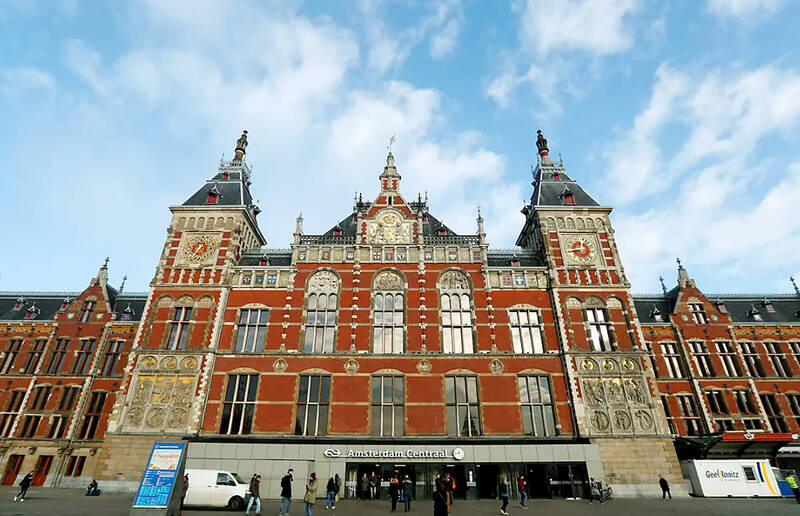The Dutch government is working on legislation that would be used to bar Chinese students from university programs on sensitive technologies, including semiconductors and defense, people with knowledge of the matter said.
While language in the planned legislation would likely avoid specifically mentioning China, the clear intention is to prevent students from the Asian nation gaining access to sensitive material in their studies, the people said, asking not to be identified as the deliberations are private.
The measures, still in draft phase, are the latest escalation in a diplomatic fight between the Netherlands and China over the semiconductor industry. The Dutch government earlier this year agreed to join the US effort to further restrict exports of chip technology to China and started an investigation into the takeover of local chipmaker Nowi by Chinese-owned firm Nexperia, stoking tensions with one of its biggest trading partners.

Photo: Reuters
The Dutch Ministry of Education confirmed in an e-mailed statement it is working on measures to introduce a mandatory screening of students and researchers in sensitive subject areas.
It added that any measures would be country-neutral and not target any specific country.
A recent Dutch intelligence agency report claimed that China “poses the greatest threat” to the nation’s economic security.”
It said that many Dutch companies and institutions find it difficult to make a proper risk assessment of economic and scientific cooperation with China.
“The country often conceals that the Chinese government or the Chinese army may be involved in such cooperation in the background,” the report said. “The disadvantages of cooperation often only become apparent in the longer term.”
It also said that China targets Dutch high-tech companies and institutions through “corporate takeovers, academic cooperation, as well as illegitimate [digital] espionage, insiders, covert investments and illegal exports.”
Earlier this year, ASML Holding NV, a critical cog in the global semiconductor industry, accused a former China-based employee of stealing confidential information. The Dutch technology company, which makes machines needed to produce high-end chips used in everything from electric vehicles to military gear, initiated an internal investigation and tightened security controls after discovering the incident, which might have violated export controls.
The Netherlands, one of the world’s top sources of machinery and expertise needed to make advanced semiconductors, is facing increasing pressure from Washington to help forge a global blockade to stifle Beijing’s rise in chipmaking. ASML is the country’s and Europe’s most valuable tech company, and China is one of its biggest customers.
The Dutch have been navigating a middle ground between the US and China in the escalating battle over the world’s chip supply chain. Dutch measures to expand restrictions on exports of the latest chip technology appeared to fall short of measures that the administration of US President Joe Biden took last year, as Washington spearheads efforts to limit exports of machinery and know-how to China.

THE TRAGEDY OF PUNCH: Footage of the seven-month-old Japanese macaque has gone viral online after he was rejected by his mother and formed a bond with a soft toy A baby monkey in Japan has captured hearts around the world after videos of him being bullied by other monkeys and rejected by his mother went viral last week. Punch, a Japanese macaque, was born in July last year at Ichikawa City Zoo. He has drawn international attention after zookeepers gave him a stuffed orangutan toy after he was abandoned by his mother. Without maternal guidance to help him integrate, Punch has turned to the toy for comfort. He has been filmed multiple times being dragged and chased by older Japanese macaques inside the enclosure. Early clips showed him wandering alone with

South Korea would soon no longer be one of the few countries where Google Maps does not work properly, after its security-conscious government reversed a two-decade stance to approve the export of high-precision map data to overseas servers. The approval was made “on the condition that strict security requirements are met,” the South Korean Ministry of Land, Infrastructure and Transport said. Those conditions include blurring military and other sensitive security-related facilities, as well as restricting longitude and latitude coordinates for South Korean territory on products such as Google Maps and Google Earth, it said. The decision is expected to hurt Naver and Kakao

Australian Prime Minister Anthony Albanese yesterday said he did not take his security for granted, after he was evacuated from his residence for several hours following a bomb threat sent to a Chinese dance group. Albanese was evacuated from his Canberra residence late on Tuesday following the threat, and returned a few hours later after nothing suspicious was found. The bomb scare was among several e-mails threatening Albanese sent to a representative of Shen Yun, a classical Chinese dance troupe banned in China that is due to perform in Australia this month, a spokesperson for the group said in a statement. The e-mail

MONEY GRAB: People were rushing to collect bills scattered on the ground after the plane transporting money crashed, which an official said hindered rescue efforts A cargo plane carrying money on Friday crashed near Bolivia’s capital, damaging about a dozen vehicles on highway, scattering bills on the ground and leaving at least 15 people dead and others injured, an official said. Bolivian Minister of Defense Marcelo Salinas said the Hercules C-130 plane was transporting newly printed Bolivian currency when it “landed and veered off the runway” at an airport in El Alto, a city adjacent to La Paz, before ending up in a nearby field. Firefighters managed to put out the flames that engulfed the aircraft. Fire chief Pavel Tovar said at least 15 people died, but